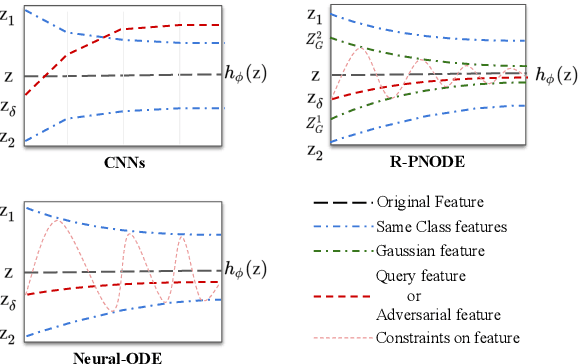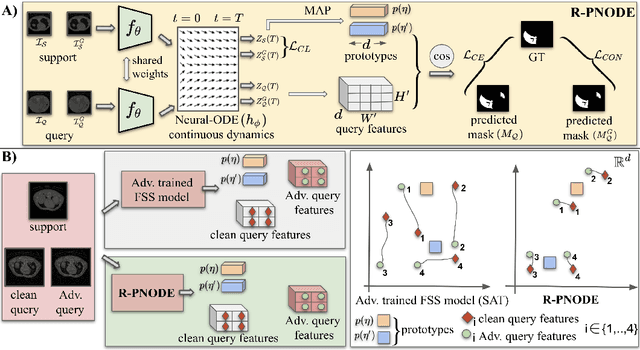Tanuj Sur
Adversarially Robust Prototypical Few-shot Segmentation with Neural-ODEs
Oct 07, 2022Abstract:Few-shot Learning (FSL) methods are being adopted in settings where data is not abundantly available. This is especially seen in medical domains where the annotations are expensive to obtain. Deep Neural Networks have been shown to be vulnerable to adversarial attacks. This is even more severe in the case of FSL due to the lack of a large number of training examples. In this paper, we provide a framework to make few-shot segmentation models adversarially robust in the medical domain where such attacks can severely impact the decisions made by clinicians who use them. We propose a novel robust few-shot segmentation framework, Prototypical Neural Ordinary Differential Equation (PNODE), that provides defense against gradient-based adversarial attacks. We show that our framework is more robust compared to traditional adversarial defense mechanisms such as adversarial training. Adversarial training involves increased training time and shows robustness to limited types of attacks depending on the type of adversarial examples seen during training. Our proposed framework generalises well to common adversarial attacks like FGSM, PGD and SMIA while having the model parameters comparable to the existing few-shot segmentation models. We show the effectiveness of our proposed approach on three publicly available multi-organ segmentation datasets in both in-domain and cross-domain settings by attacking the support and query sets without the need for ad-hoc adversarial training.
Robust Prototypical Few-Shot Organ Segmentation with Regularized Neural-ODEs
Aug 26, 2022



Abstract:Despite the tremendous progress made by deep learning models in image semantic segmentation, they typically require large annotated examples, and increasing attention is being diverted to problem settings like Few-Shot Learning (FSL) where only a small amount of annotation is needed for generalisation to novel classes. This is especially seen in medical domains where dense pixel-level annotations are expensive to obtain. In this paper, we propose Regularized Prototypical Neural Ordinary Differential Equation (R-PNODE), a method that leverages intrinsic properties of Neural-ODEs, assisted and enhanced by additional cluster and consistency losses to perform Few-Shot Segmentation (FSS) of organs. R-PNODE constrains support and query features from the same classes to lie closer in the representation space thereby improving the performance over the existing Convolutional Neural Network (CNN) based FSS methods. We further demonstrate that while many existing Deep CNN based methods tend to be extremely vulnerable to adversarial attacks, R-PNODE exhibits increased adversarial robustness for a wide array of these attacks. We experiment with three publicly available multi-organ segmentation datasets in both in-domain and cross-domain FSS settings to demonstrate the efficacy of our method. In addition, we perform experiments with seven commonly used adversarial attacks in various settings to demonstrate R-PNODE's robustness. R-PNODE outperforms the baselines for FSS by significant margins and also shows superior performance for a wide array of attacks varying in intensity and design.
 Add to Chrome
Add to Chrome Add to Firefox
Add to Firefox Add to Edge
Add to Edge